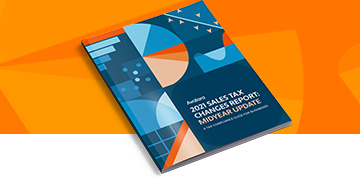
Alcohol Marketplaces 2.0 Part 1: Solicitation of sales by unlicensed third-party providers
Only businesses that hold a license to sell alcohol at retail can sell alcohol to consumers. That simple fact complicates matters for unlicensed entities such as online marketplaces, delivery apps, and delivery services that would like to create or enhance platforms to facilitate alcohol sales. Marketplace platform providers, alcohol licensees, and alcohol and tax regulatory agencies all have different goals and concerns when it comes to the sale of beverage alcohol products.
In this Alcohol Marketplaces blog series, Rebecca Stamey-White, partner at Hinman & Carmichael LLP, and Jeff Carroll, general manager of Avalara for Beverage Alcohol, will explore multiple issues surrounding alcohol marketplaces and propose a compliance framework to meet the goals and concerns of different stakeholders.
Disclaimer: This post may constitute attorney advertising and is not intended to provide or be relied on as legal advice. Perform independent legal research and consult your lawyer.
Online shopping has completely changed the way people shop and engage with brands. Consumers expect to be able to purchase alcohol in the same ways they shop for other products online, and yet, the U.S. alcohol regulatory scheme has been slow to adapt to the fast-changing ecommerce environment.
The pandemic era has put even greater pressure on regulators to respond to the new normal, and fast. Alcohol brands and retailers want to reach their consumers where they are: avoiding in-person shopping experiences and unable to try new products in a bar or restaurant setting. Marketplaces like Vivino, Drizly, Wine.com, and many others have reported massive growth since the COVID-19 lockdowns began in March of 2020 and don’t show signs of slowing down as more businesses are making remote working more permanent and the vaccine rollout is slower than expected.
The 2011 California ABC guidance
With the second dot-com boom expanding in the late aughts and teens, more new companies launched platforms with alcohol products available for purchase. Online wine sales especially exploded when ecommerce and mobile app development coincided with a U.S. Supreme Court decision that forced states to permit out-of-state (read: California) wine to be shipped directly to consumers (DTC) if they permitted in-state wineries to do the same (see Granholm v. Heald (2005)). But there was still confusion about who could do what online. Many sites started testing the waters and the patience of alcohol regulators, who lacked clear statutory guidance on and jurisdiction over virtual marketplaces.
The California Department of Alcoholic Beverage Control (ABC) issued its first industry advisory on Unlicensed Third Party Service Providers in 2009 and, following mass confusion from the industry, formed a working group of stakeholders to clarify the advice in February 2011. The stakeholder group collaborated with ABC and proposed a set of principles for unlicensed entities that wanted to facilitate the sale of beverage alcohol products. Later on that year, ABC published a revised advisory titled Third Party Providers that laid out the principles in detail.
Jeff covered this issue for WineAmerica at the time in his piece Understanding the California ABC’s New Advisory for Wineries and Third Party Providers. Here are the main principles from the advisories:
Principle 1: Only licensees may engage in activities that require an alcoholic beverage license.
Principle 2: Licensees are ultimately responsible for the actions of third parties hired to conduct any activities involving the sale or marketing of alcohol on their behalf.
Principle 3: The flow of funds must be controlled by the licensee and third parties should not share in the profits, but may receive service fees. From the ABC’s 2011 advisory: “the Third Party Provider cannot independently collect the funds, retain its fee, and pass the balance on to the licensee.” The flow of funds is especially important, and we’ll cover that in detail in a future post.
Principle 4: Unlicensed third parties cannot take title to alcoholic beverages. The licensee must retain control over the storage and fulfillment of alcohol to consumers.
California’s industry advisories became the framework for other state regulatory approaches to ecommerce alcohol models, including Texas, New York, and Washington, D.C. States that haven’t adopted their own policies on these models generally have not conducted enforcement actions against those operating in compliance with the principles above.
How are we doing 10 years later?
It’s been almost 10 years since the ABC’s last industry advisory on third-party providers and we’ve seen many alcohol beverage ecommerce sites boom and bust. Wine clubs are still going strong, but flash sale sites went by the wayside. Blind tasting had its moment, along with mini bottles.
Multilevel marketing and celebrity brands have influence. Restaurant and retail delivery has been challenged, fees limited, and gone big time, now with cocktails to go. Amazon Wine died to give Whole Foods and Prime the spotlight. And now Uber will soon acquire Drizly, and Vivino has raised a large round of funding for innovations. Spirits and beer want in on the action, and cannabis is becoming more prevalent.
It’s been a busy decade, but for the most part, enforcement has been very limited and guidance can still be relied on, though some persistent ambiguities may eventually catch up to industry members. We’ve seen inquiries over the years into different models — New York with its declaratory rulings has had the most public enforcement — but many states, including California and New York, have quietly inquired into third-party service provider business models without creating public guidance for others to follow. And with continued stay-at-home orders, many of the same mistakes continue to be made. Questions remain over “flow of funds,” whether the current payment processing providers actually comply with alcohol beverage laws, what’s actually required to avoid sales to minors, and whether regulators will dig deeper in the next 10 years.
Meanwhile, courts have been busy deciding other issues that impact these models, including those concerning gig workers and the collection of sales taxes from the consumer’s state of residence. We’ll dive into complications for alcohol ecommerce models that come from the South Dakota v. Wayfair case in our next post.
Have tax or compliance questions? Contact Avalara's Beverage Alcohol team.
Have legal or regulatory questions? Contact Hinman & Carmichael LLP.
New 2021 tax changes: midyear beverage alcohol update
Your guide to navigating the complicated world of tax compliance and preparing for the future

The 4 steps to age verification for direct shippers
Make sure you’re following the rules when it comes to selling to customers 21 and over.


Economic nexus in the beverage alcohol industry: Learn how state laws create tax collection obligations for your business
Stay up to date
Sign up for our free newsletter and stay up to date with the latest tax news.
















